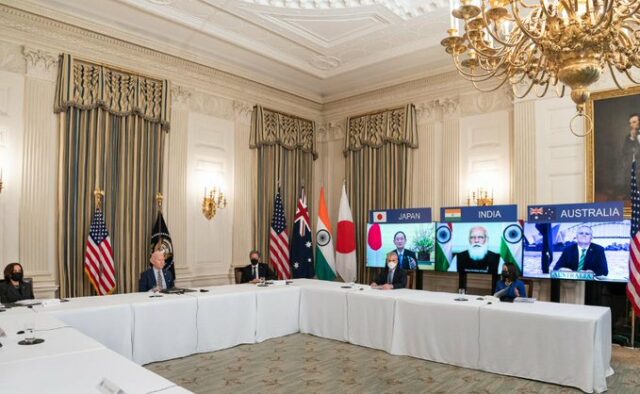NEW DELHI: Indonesia-China ties that completed 70 years last year can be described as both pragmatic and prickly. China is Indonesia’s biggest trading partner. But Indonesia, like other littoral states in the South China Sea, has often been at the receiving end of Chinese expansionism. There’s possibility that escalation of conflict in the South China Sea could erupt into a limited war, says Vice-Admiral Amarulla Octavian, Rector of Indonesia Defense University. In a written interview given to StratNews Global Editor , VAdm Octavian also spoke about diplomatic efforts to resolve overlapping claims to the Natuna Islands, the code of conduct for the South China Sea that is being worked upon and the Quad, as Indonesia sees it.

Q: How would you define Indonesia’s security concerns and threats?
A: Indonesia’s security concerns at the domestic level are dealing with drugs and terrorism. Domestic security stability also takes into account the importance of dealing with various social conflicts in society, both horizontal and vertical. Meanwhile, threats to national security are always related to Indonesia’s national interests at the regional and global levels. The settlement of borders on land and at sea is still a separate threat to relations with several neighbouring countries. Likewise, the enforcement of sovereignty in the air is currently being considered—how to deal with the illegal use of unmanned systems by several parties. The threat to maritime security also needs to be aware of the possibility of escalation of conflict in the South China Sea which could erupt into a limited war. Of course, Indonesian territory can become a spillover from the war theatre by belligerent parties. However, currently the Indonesian government is working hard to deal with the Covid-19 pandemic which is considered a form of non-military threat.
Q: Is there particular concern over the security of the Natuna Islands? Please explain in detail
A: The concern over Natuna Islands is, of course, related to the overlapping of parts of Indonesia’s EEZ in the North Natuna Sea with China’s claims in the South China Sea. Indonesia fully understands the situation and conditions of all parties to a dispute and strives to find the best solution for all. Indonesia is working hard so that the conflict does not escalate. Diplomatic efforts are on, both bilaterally and multilaterally. Even Track 1, Track 2 and Track 1.5 efforts are on. It’s a concrete form of Indonesia’s important role in the region in accordance with international law and the Indonesian constitution. Indonesia’s sovereignty over the Natuna Islands is recognised by all countries.
Q: Have these concerns been addressed to China specifically? How has China reacted?
A: China recognises Indonesia’s sovereignty over the Natuna Islands. There is no problem with the Natuna Islands. Indonesia also ensures that its position is in line with the international viewpoint that does not recognise China’s unilateral claims to the South China Sea, including the overlapping claims over parts of Indonesia’s EEZ in the Natuna Sea.
Q: As a member of ASEAN, has Indonesia voiced these concerns with that body? With what result?
A: Indonesia and ASEAN are one identity unit that seeks to find the best solution by encouraging the signing of the Code of Conduct in the South China Sea involving the 10 ASEAN countries and China. Indonesia always invites ASEAN members having disputes with China to prioritize dialogue. Indonesia has even tried to establish maritime security cooperation to face transnational organised crimes, including overcoming terrorism in the Southeast Asian region. The results were quite good and received a positive response from ASEAN member countries and China. Maritime security cooperation also involves the participation of several countries outside the region.
Q: How do you see the Code of Conduct currently being negotiated with China? Is it weighted heavily in favour of China? Could it make ASEAN subservient to China?
A: The Code of Conduct is currently at the finalisation stage. The interests of ASEAN and China are formulated in a balanced and proportionate manner.
Q: What is Indonesia’s perception of the Indo-Pacific and the Quad?
A: Indonesia’s perception of the Indo-Pacific is maritime security cooperation to achieve mutual prosperity with all actors, both state and non-state. Indonesia has a strong interest in security and stability in the Indian and the Pacific oceans. All countries bordering the two oceans are also the focus of Indonesia’s foreign policy. Indonesia views the Quad as an attempt by several countries to offer different solutions to resolving conflicts in the South China Sea. It admitted that some of these solutions could injure efforts to prevent the conflict, which had been going well so far. Indonesia hopes that the Quad aligns with ASEAN interests.
Q: Has Indonesia had any discussions with India on the above?
A: Indonesia and India have had maritime cooperation for a long time. India’s attention to the waters of Southeast Asia and the South China Sea was matched by Indonesia’s attention to the Indian Ocean. The two countries are also closely linked in cooperation under the IORA and IONS. Indonesia believes India also has the same determination to put forward the best solutions for maritime interests.
Q: How do you see defence and security cooperation with India? Is this growing and in what areas?
A: Security cooperation between Indonesia and India is well developed in line with the foreign policies of both countries. Indonesia is a big country in Southeast Asia and India is also a big country in South Asia. The two countries have equal position and, of course, have relatively the same national interests to take advantage of security stability as an important key to economic growth. Cooperation between Indonesia and India as the second and fourth most populous countries in the world has great prospects. The resources and potential of the two countries can increase exponentially and be mutually beneficial not only for the two countries but also for the world.
Q: Indonesia’s economic engagement with China is growing. Indonesia is part of BRI. Does this limit Jakarta’s room for diplomatic manoeuvre?
A: The vision of Indonesia as a Global Maritime Fulcrum can be accepted by all countries, including China. This vision can also complement BRI as long as it is mutually beneficial. Indonesia’s economic diplomacy is also running well to open up various opportunities to increase economic growth. Indonesia always invites economic cooperation at regional and global levels.
















